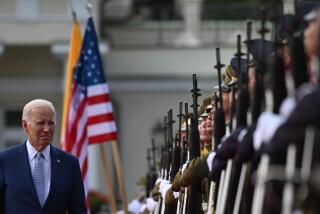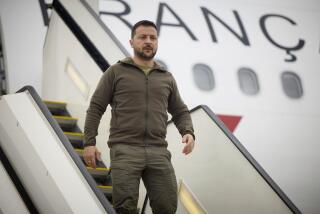U.S.-Soviet Stumbling Blocks Remain, Bush Cautions : Diplomacy: Future of Germany emerges as the top unresolved issue for the upcoming summit.
- Share via
PORTLAND, Ore. — Declaring himself “somewhat encouraged” by progress toward a new nuclear arms treaty with the Soviet Union, President Bush cautioned Sunday that “other problems” in U.S.-Soviet relations remain.
“We’ve had differences with the Soviets for a long, long time on a wide array of subjects,” Bush said, citing particularly the future of Germany. He made his remarks to reporters on Air Force One shortly before taking off from Houston en route here.
Bush’s comments, his most extensive since Secretary of State James A. Baker III completed four days of negotiations with Soviet leaders in Moscow, underlined the degree to which German unification and its implications for the balance of power in Europe is emerging as the major unresolved issue for the Bush-Mikhail S. Gorbachev summit that begins May 30.
“I think in the arms control area, there’s clearly been some progress” and “we’ll have a good summit,” Bush said. But on other parts of the summit agenda, particularly Germany, “we’re just plugging away.”
“Nobody thought it would be easy,” Bush added.
Baker, who spoke with Bush by telephone Sunday morning, resolved most major issues blocking progress on a new nuclear weapons treaty and an agreement drastically reducing chemical weapons.
But Baker was unable to break a deadlock over Germany and a resulting stall in talks on reducing non-nuclear weapons and armies in Europe. Those unresolved issues will be major topics for the two presidents when they meet.
Talks on reducing non-nuclear forces--the so-called CFE, or conventional forces in Europe, negotiations--had been moving quickly earlier in the year. The talks are aimed at reducing Soviet and American forces in Europe to a level of 195,000 for the Soviets and 225,000 for the United States. The Soviets currently have several times that many troops in Eastern Europe, most of them in East Germany.
Since the East German elections in April, movement in the talks has slowed. The elections made clear that a united Germany will essentially be ruled by the current leadership of West Germany, eliminating the Soviets’ most powerful European ally, East Germany, and grafting it onto the North Atlantic Treaty Organization.
That prospect has deeply disturbed many Soviet leaders, U.S. analysts say. German forces have invaded Russian territory twice this century in wars that cost millions of lives, and fears of a possible future German threat remain among Soviet citizens.
On Saturday, Soviet Foreign Minister Eduard A. Shevardnadze declared that the talks aimed at reducing U.S. and Soviet armies in Europe cannot be completed until some new way is found to guarantee Soviet security.
Bush and his aides have been anxious to see the talks wrapped up this year to “lock in” the Soviet withdrawal from Eastern Europe before any unforeseen event might cause a change in current Soviet policies.
Asked if he still believes a treaty on conventional forces can be completed before the end of the year, Bush replied, “Oh sure, sure.” But he declined to say what steps he thought were needed to reach an agreement.
“We’ll leave the negotiating to the negotiators,” he said. “But we’ve got to get that done.”
Finishing the CFE treaty “is very important, not just to us but to all of Europe,” he said.
Bush was also guarded in response to questions about Lithuania, refusing to say whether Baker had urged Lithuanian leaders he met in Moscow to suspend their republic’s declaration of independence from Moscow.
“I’m not going to discuss what he talks about in private,” Bush said. “If you negotiate all these things in public, you don’t make any progress.”
Asked if the Administration believes Lithuania should suspend the declaration, which the Lithuanian leadership so far has balked at doing, Bush again declined to answer.
“We want to see talks going, and we want to see self-determination of the people of Lithuania determined. We want to have them get the freedom that a lot of other people have. So there’s talks going on on that,” he said.
With Gorbachev due to arrive in Washington in 10 days for three days of summit talks with Bush, the White House has been anxious to avoid any sudden flare-up over the three Baltic republics. Lithuania, Latvia and Estonia each have voted to secede from the Soviet Union and have been locked in a tense confrontation with Moscow.
Bush traveled to Portland to speak at the dedication of a memorial to slain police officers where he delivered a by-now-standard call for tougher anti-crime legislation.
More to Read
Get the L.A. Times Politics newsletter
Deeply reported insights into legislation, politics and policy from Sacramento, Washington and beyond. In your inbox twice per week.
You may occasionally receive promotional content from the Los Angeles Times.











